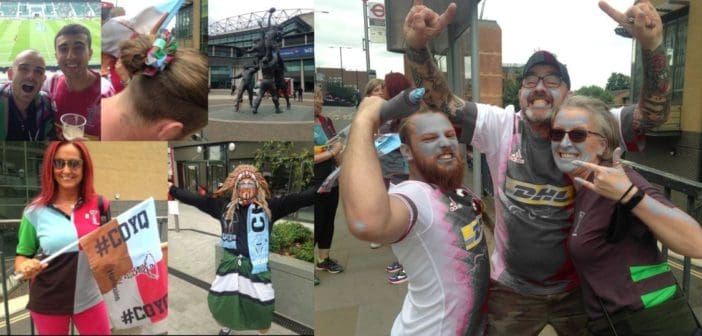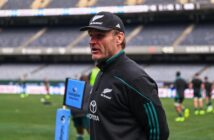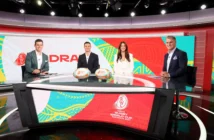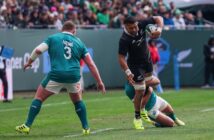Whilst Harlequins may have beaten Exeter 36-38 to win the Gallagher Premiership, there were two other winners at Twickenham: rugby and the fans.
Less than a mile from their own home stadium, Quins beat a superb Exeter club on a day of eleven tries, some of them breathtaking in their execution.
The allocation of tickets to local front-line workers added to the partisan support for the club based just a stone’s throw away, but take nothing away from the travelling Devonians. Exeter fans contributed to the day as much as anyone and were characteristically generous in their praise for their conquerors.
The lead changed hands no fewer than four times. Quins took the lead three separate times including the game’s first score with a penalty try within minutes of the start. Exeter took the lead from them twice.
Quins failed to score when a man up and managed to score when a man down.
Both sides played the game at times like they were the 1973 Barbarians at Cardiff Arms Park. At other times, the individual battles within the scrum were titanic and the game had its share of forward rollover tries to keep rugby purist and scrum coaches around the country happy.
BBC called it “one of the greatest games of club rugby union ever played”. The try count was immense. Eleven were scored with Quins winning the count by 6-5.
My first comparison was to compare it to another game on this legendary turf, the second World Cup semi-final at Twickenham in 1999 when France played some of the most enthralling rugby ever seen to beat the invincible All Blacks 43-31.
If that game resembled this one in terms of outstanding rugby and spectacular tries, the 1990 Murrayfield encounter when England played Scotland for the Championship, Calcutta Cup and the Grand Slam is on a par for the accolade of unforgettable, although that game, falling as it did while Mrs Thatcher was trying to foist the hated Poll Tax on Scotland, had political overtones. (We only later found out that some of the Scotland players were Tories!)
Other long time rugby fans had their own comparisons. Jeremy Thompson, a former African correspondent for Sky News and a journalist who covered the famous 1995 World Cup final in Johannesburg, said the game trumped all of his past rugby memories.
At the end of that famous match 26 years ago, South African President Nelson Mandela – once the leader of the ANC and a prisoner on Robben Island – wore a Springbok rugby shirt and cap as he presented the trophy to South Africa’s Afrikaaner captain François Pienaar.
It was a gesture that resonated around the world and well beyond rugby circles but purely as a sporting spectacle, Thompson was effusive about what he had just witnessed 26 years later:
“I witnessed the moment when Nelson Mandela handed the Webb Ellis Cup to Francois Pienaar with all its political repercussions but this was the moment on the sports field that I have enjoyed more than any other in my life.
“For pure bravado, for a belief in the unexpected, to win against all odds , to come from the bottom of the table to climb to to fourth place and to be written off by everybody, to win here in such style, without choosing to kick a penalty, to always roll the dice and go for the big play, was a sign of sheer bravery and sporting courage and brilliance the likes of which I’ve rarely ever seen.”
Both sets of fans illuminated the day. The crowd was capped at 10,000 but those lucky enough to be in attendance made the noise of four times that number.
Either the Chiefs Tomahawk Chop chant rang around the stadium or the Manfred Mann classic Mighty Quinn, reworked to suit the occasion engulfed Twickenham.
The fans brought colour and passion. As I was taking photos pre-match for this article, some Harlequins fans even thanked me. Even for rugby, this is rare,
On the way home, I met two young female Exeter fans whose knowledge of the game was only superseded by their generosity towards Harlequins on their triumph. Despite their disappointment, their hopes for the future of English club rugby were both optimistic and realistic. There wasn’t a fan or frontline worker there who was not a credit to rugby.
On the field, Exeter were of course disappointed not to regain their crown. Their Director of Rugby, Rob Baxter, said:
“Quite frankly we weren’t good enough were we? We conceded 40 points which tells you the whole story. We came in with the best defence and we haven’t achieved that today.
“Harlequins have come out and won the game with their energy and emotion and they deserve massive credit. We can talk about it and analyse it but today wasn’t our day.”
There were moments however when it appeared that the Exeter juggernaut would steamroll over Harlequins’ stoic resistance.
After opening the scoring with that penalty try in six minutes, Exeter played ten minutes without Jonny Hill, sent to the sin bin for collapsing the scrum.
Not only did the Chiefs hold out with a man disadvantage but scored within seconds of his reappearance.
That was one of many moments where I thought the Quins’ chance had gone. For a while that seemed justified, and the Chiefs took the lead for the first time on 29 minutes when Alex Hepburn scored an iconic Chiefs forward pushover try.
The decision seemed obvious to all but took the TMO an eternity to add to Harlequins’ anguish. Marcus Smith was sin-binned in the aftermath. That was to cost Quins.
At 14-7 up and having survived a ten-minute yellow card, the world lay at Exeter’s feet.
Quins rallied and Wilco Louw scored on the brink of the break but, to sour Quins’ half time oranges, with Smith absent, Joe Marchant stepped up to take the conversion. He hit the post to keep the Chiefs just ahead, 14-12 at the interval.
Their best shot gone? That was the wisdom.

“Sheer bravado!” – Sky TV’s former African correspondent has seen sport around the world but this game will remain in his memory
But even before that missed chance to go in level had the chance to deflate the Quins, Alex Dombrandt scored an added time try that shocked the crowd in more ways than one. Within just a few metres of the Chiefs line, Quins had opted for a scrum rather than take the easy three points.
It was a triumph, as Jeremy Thompson put it later of “sheer bravado”.
Andre Esterhuizen scored Quins best try of the match so far just after the interval to send Quins fans into dreamland after some open rugby and passing out of the top shelf.
Then Stuart Hogg arrived for Exeter. The game turned with two very different Exeter tries as Sam Simmonds and Ollie Devoto broke Quin’s hearts, To add insult to injury, Joe Simmonds converted both.
Exeter led by two and that earlier Marchant conversion miss looked to have cost Harlequins dear. We wrote them off again. At our peril. Again. Two became five as Joe Simmonds kicked the games first three-pointer in the 67th minute.
The perilous pen was running out of ink. Surely the Twickenham side had given their all?
Then came the most remarkable eight minutes in Harlequins history. Louis Lynagh scored two almost identical tries in the right-hand corner and Marcus Smith converted both.
Scenes of joy and relief greeted the final whistle. Harlequins fans poured out into the street and bars they know so well to relive and savour a momentous day in their history, every so often being stopped to receive congratulations from fans of their defeated opponents.
It was that kind of day. A day for great rugby but more than that – for great fans
Exeter: J Nowell (H Skinner 79); A Cuthbert (S Hogg 44), H Slade, O Devoto, T O’Flaherty; J Simmonds, J Maunder (S Townsend 53); A Hepburn (B Moon 55), L Cowan-Dickie (J Yeandle 62), H Williams (M Street 75), J Gray, J Hill (S Lonsdale 75), J Kirsten, R Capstick (D Armand 44), S Simmonds.
Yellow card: J Hill, 4
Harlequins: T Green; L Lynagh, J Marchant, A Esterhuizen (B Tapuai 79), C Murley (L Northmore 59); M Smith, D Care; J Marler, S Baldwin (J Gray 59), W Louw (W Collier 59), M Symons, S Lewies (D Lamb 59), Chisholm (T Lawday 74), J Kenningham, A Dombrandt.
Yellow card: M Smith, 29
Follow us on Twitter @ProstInt
![Prost International [PINT]](https://prostinternational.com/wp-content/uploads/2021/08/PINTtFontLogoRoboto1536x78.jpg)



